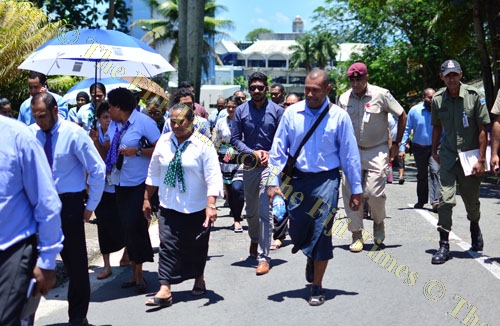FIJI is ranked as the 16 most at risk country to natural hazards in the UN World Risk Index.
Fiji is at risk to natural hazards such as earthquakes, volcanic eruptions, storms, floods, droughts and sea level rise and with climate change both the frequency and severity of those events are expected to increase.
New Zealand High Commissioner to Fiji Jonathan Curr highlighted this during the launch of the Fiji National Disaster Awareness Week at Sukuna Park in Suva yesterday. “Fiji is not alone here, with four other Pacific Island countries such as Vanuatu, Tonga, Solomon Islands and Papua New Guinea being in the top 10 most at risk countries,” he said.
“Every year in this region, we are reminded of the need for greater awareness of the destructive potential of disasters, and a renewed commitment to preparedness, in order to minimise the economic and social impact of these events to prevent loss of life and limb.”
He said the people of Fiji had demonstrated great resilience in the past, most notably in the response to and recovery from Severe Tropical Cyclone Winston in February 2016.
“Natural disasters have a negative impact on social and economic development. Disaster events undermine development gains, both those generated domestically within Fiji, and those supported by international partners, such as New Zealand, Australia and others,” he said.
“Disaster events redirect sometimes scarce resources from important strategic investments such as roads, schools and hospitals to response and recovery efforts. “While these efforts are admirable, and often give people a much needed hand up, they come at a cost.
“For example, in addition to causing the tragic loss of 44 lives, Severe TC Winston is estimated to have cost Fiji $US1.38 billion, or 31 per cent of the country’s GDP. That’s almost $F3b.
“Imagine for a moment what could be done with that $3b, or even a portion of that sum, if it didn’t have to be spent on recovering from a major natural disaster? That is why reducing the impact of natural hazards is so important because it saves lives and saves money.”
He said it was a generally accepted principle that investment in disaster risk reduction before a natural hazard event can significantly reduce the cost of recovering from a resulting disaster.
“While there are mixed opinions on the exact ratios, a commonly referenced World Bank figure is that every $1 invested in disaster risk reduction saves $7 in recovery costs,” he said.
“Disaster response might grab the headlines, but it is disaster risk reduction that will have a greater impact on saving lives and preserving livelihoods, because if its vulnerability to natural hazards, Fiji has much to gain from increasing awareness and strengthening preparations for the natural disasters that we know are coming.”
He said greater disaster awareness would help safeguard families, homes and communities.
“It will help protect the valuable gains that Fiji is making in terms of its own social and economic development,” he said.
The New Zealand High Commission team are working closely with the National Disaster Management Office team to develop a large-scale, multi-year package of assistance that will enable New Zealand to support a range of disaster risk reduction activities in Fiji.
“The aim is to help protect development investments and reduce the scale, and cost, of future disaster events,” he said.
Ministry of Rural and Maritime Development, National Disaster Management and Meteorological Services permanent secretary Meleti Bainimarama said as individuals people needed to take the initiative to improve their knowledge and understanding of the various natural hazards.
“”This understanding will not only improve individual resilience, but the overall resilience of a household and the community,” he said.
“Basic knowledge and understanding about hazards and disasters contribute to saving lives.
“This basic principle is recognised and promoted at the international level through the Sendai Framework where one of its four priority action is understanding disaster risk.”
He said one of the main reasons behind organising the National Disaster Awareness Week was to improve people’s understanding of hazards and disasters.
The theme of the National Disaster Awareness Week is ‘Reducing Disaster Economic Loss’.




